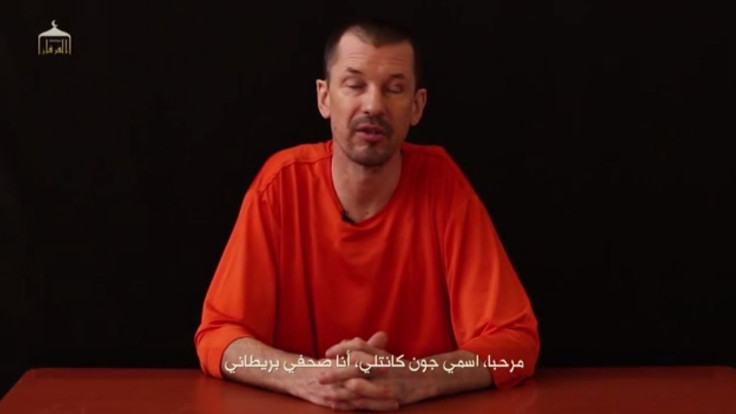New ISIS Video 'Lend Me Your Ears' Released With John Cantlie, Amid First US Airstrikes On Syria

The Islamic State group released the second part of their propaganda series, which appears to be narrated by kidnapped British journalist John Cantlie, just as the first U.S. bombs began to fall on the militants' strongholds in Syria. And, Cantlie's comments seem tailored to challenge the American government to ground combat.
In the video released early Tuesday, Cantlie makes a reference to President Barack Obama’s speech earlier this month, which suggests that the video was filmed after the U.S. announced airstrikes in Syria. The militants are reportedly holding Cantlie and other western hostages in Raqqa, the self-declared capital of the Islamic State, and the first target in the U.S. air campaign in Syria.
Throughout the nearly six-minute video, posted on the terrorist monitoring group SITE Intelligence, Cantlie is seen seated at a table wearing an orange jumpsuit. The jumpsuit appears to be the same as in the first video in which Cantlie announced he would be narrating the multi-part propaganda “lecture series.” Cantlie introduces himself in the recent video as the “British citizen abandoned by my government and the long-time prisoner of the Islamic State.”
Cantlie is a freelance journalist whose bylines appeared in the Sunday Times of London and The Telegraph. He was captured in 2012 along the Turkish border in Syria with U.S. journalist James Foley, according to the New York Times.
“In this program, we’ll see how the Western governments are hastily marching towards all-out war in Iraq and Syria without paying any heed to the lessons of the recent past,” Cantlie says in the video.
The propaganda video begins with a quote from former CIA chief Michael Scheuer. Cantlie quotes Scheuer in a statement that said defeating the militant group formerly known as the Islamic State of Iraq and Syria, or ISIS, would take boots on the ground. Cantlie then criticizes the Obama administration’s strategy to combat the militant group from the air, also suggesting that the only way to defeat the group is through ground force.
“You know, air strikes only, no troops on the ground, limited operation time, no mission creep. All those pre-combat agreements that tend to get forgotten after months of nasty stuff,” Cantlie says.
Cantlie’s suggestion that the U.S. must sent ground troops to Syria in order to defeat the Islamic State group is one mirrored in the militants' documentary-style video released last week, entitled “Flames Of War: Fighting Has Just Begun.” That video conveyed the message that U.S. troops will be back in Iraq, and possibly in Syria, which is something the militants seem eager to encourage.
“It’s all quite a circus,” Cantlie says, before inviting viewers to join him again “for the next program.”
© Copyright IBTimes 2025. All rights reserved.






















